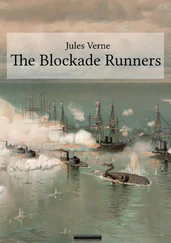“Foxes!” cried Bell.
“Bears!” shouted the doctor. “Five!”
“Our dogs! Our provisions!” cried Simpson. A band of foxes and bears had attacked the sledge, and were making havoc with the provisions. The instinct of pillage made them agree; the dogs barked furiously, but the herd took no notice, and the scene of destruction was lamentable.
“Fire!” cried the captain, discharging his gun. His companions imitated him. Upon hearing the quadruple detonation the bears raised their heads, and with a comical growl gave the signal for departure; they went faster than a horse could gallop, and, followed by the herd of foxes, soon disappeared amongst the northern icebergs.
Table of Contents
The frost-rime had lasted about three-quarters of an hour; quite long enough for the bears and foxes to make away with a considerable quantity of provisions which they attacked all the more greedily, arriving, as they did, when the animals were perishing with hunger from the long winter. They had torn open the covering of the sledge with their enormous paws; the cases of pemmican were open, and half-empty; the biscuit-bags pillaged, the provisions of tea spilt over the snow, a barrel of spirits of wine broken up, and its precious contents run out; the camping materials lying all about. The wild animals had done their work.
“The devils have done for us!” said Bell.
“What shall we do now?” said Simpson.
“Let us first see how much we’ve lost,” said the doctor; “we can talk after.”
Hatteras said nothing, but began picking up the scattered objects. They picked up all the pemmican and biscuit that was still eatable. The loss of so much spirits of wine was deplorable, as without it it was impossible to get any hot drinks—no tea nor coffee.
The doctor made an inventory of the provisions that were left, and found that the animals had eaten two hundred pounds of pemmican and a hundred and fifty pounds of biscuit; if the travellers continued their journey they would be obliged to put themselves on half-rations. They deliberated about what was to be done under the circumstances. Should they return to the brig and begin their expedition again? But how could they resolve to lose the hundred and fifty miles already cleared? and coming back without the fuel, how would they be received by the crew? and which of them would begin the excursion again? It was evident that the best thing to do was to go on, even at the price of the worst privations. The doctor, Hatteras, and Bell were for going on, but Simpson wanted to go back; his health had severely suffered from the fatigues of the journey, and he grew visibly weaker; but at last, seeing he was alone in his opinion, he took his place at the head of the sledge, and the little caravan continued its route. During the three following days, from the 15th to the 17th of January, the monotonous incidents of the journey took place again. They went on more slowly; the travellers were soon tired; their legs ached with fatigue, and the dogs drew with difficulty. Their insufficient food told upon them. The weather changed with its usual quickness, going suddenly from intense cold to damp and penetrating fogs.
On the 18th of January the aspect of the icefield changed all at once. A great number of peaks, like pyramids, ending in a sharp point at a great elevation, showed themselves on the horizon. The soil in certain places was seen through the layer of snow; it seemed to consist of schist and quartz, with some appearance of calcareous rock. At last the travellers had reached terra firma , and, according to their estimation, the continent must be New Cornwall. The doctor was delighted to tread on solid ground once more; the travellers had only a hundred more miles to go before reaching Belcher Cape; but the trouble of walking increased on this rocky soil, full of inequalities, crevices, and precipices; they were obliged to plunge into the interior of the land and climb the high cliffs on the coast, across narrow gorges, in which the snow was piled up to a height of thirty or forty feet. The travellers soon had cause to regret the levels they had left, on which the sledge rolled so easily. Now they were obliged to drag it with all their strength. The dogs were worn out, and had to be helped; the men harnessed themselves along with them, and wore themselves out too. They were often obliged to unload the provisions in order to get over a steep hill, whose frozen surface gave no hold. Some passages ten feet long took hours to clear. During the first day they only made about five miles on that land, so well named Cornwall. The next day the sledge attained the upper part of the cliffs; the travellers were too exhausted to construct their snow-house, and were obliged to pass the night under the tent, enveloped in their buffalo-skins, and drying their stockings by placing them on their chests. The consequences of such a state of things may be readily imagined; during the night the thermometer went down to 44 degrees below zero, and the mercury froze.
The health of Simpson became alarming; an obstinate cold, violent rheumatism, and intolerable pain forced him to lie down on the sledge, which he could no longer guide. Bell took his place; he was not well, but was obliged not to give in. The doctor also felt the influence of his terrible winter excursion, but he did not utter a complaint; he marched on in front, leaning on his stick; he lighted the way; he helped in everything. Hatteras, impassive, impenetrable, insensible, in as good health as the first day, with his iron constitution, followed the sledge in silence. On the 20th of January the weather was so bad that the least effort caused immediate prostration; but the difficulties of the ground became so great that Hatteras and Bell harnessed themselves along with the dogs; the front of the sledge was broken by an unexpected shock, and they were forced to stop and mend it. Such delays occurred several times a day. The travellers were journeying along a deep ravine up to their waists in snow, and perspiring, notwithstanding the violent cold. No one spoke. All at once Bell looked at the doctor in alarm, picked up a handful of snow, and began to rub his companion’s face with all his might.
“What the deuce, Bell?” said the doctor, struggling.
But Bell went on rubbing.
“Are you mad? You’ve filled my eyes, nose, and mouth with snow. What is it?”
“Why,” answered Bell, “if you’ve got a nose left, you owe it to me.”
“A nose?” said the doctor, putting his hand to his face.
“Yes, Mr. Clawbonny, you were quite frostbitten; your nose was quite white when I looked at you, and without my bit of rubbing you would be minus nose.”
“Thanks, Bell,” said the doctor; “I’ll do the same for you in case of need.”
“I hope you will, Mr. Clawbonny, and I only wish we had nothing worse to look forward to!”
“You mean Simpson! Poor fellow, he is suffering dreadfully!”
“Do you fear for him?” asked Hatteras quickly.
“Yes, captain,” answered the doctor.
“What do you fear?”
“A violent attack of scurvy. His legs swell already, and his gums are attacked; the poor fellow is lying under his blankets on the sledge, and every shock increases his pain. I pity him, but I can’t do anything for him!”
“Poor Simpson!” said Bell.
“Perhaps we had better stop a day or two,” said the doctor.
“Stop!” cried Hatteras, “when the lives of eighteen men depend upon our return! You know we have only enough provisions left for twenty days.”
Neither the doctor nor Bell could answer that, and the sledge went on its way. In the evening they stopped at the foot of an ice-hill, out of which Bell soon cut a cavern; the travellers took refuge in it, and the doctor passed the night in nursing Simpson; he was a prey to the scurvy, and constant groans issued from his terrified lips.
Читать дальше












